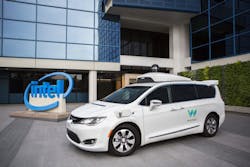Writing in a blog last week, Intel CEO Brian Krzanich revealed that Waymo’s self-driving Chrysler Pacifica hybrid minivans “feature Intel-based technologies for sensor processing, general compute and connectivity, enabling real-time decisions for full autonomy in city conditions.” By working closely with Waymo, he added, “Intel can offer Waymo’s fleet of vehicles the advanced processing power required for level 4 and 5 autonomy.”
It would be interesting to know what Waymo was using onboard to generate the AI computing capability needed for full self-driving tasks, but Intel isn’t saying. Intel did, however, note in a Twitter post (“Intel Official News”) that Waymo was using Arria FPGAs, Intel Gigabit Ethernet, and Intel XMM LTE modems for connectivity and communication, and Xeon processors for general computing tasks.
For its part, Waymo stated that the compute platform on its self-driving Chrysler Pacificas “is designed entirely in-house by Waymo engineers.” It turns out that Intel has been supplying the components Waymo uses for its self-drive computing platform since 2009.
The concept of “dancing with the person who brought you”—in other words, paying attention to the person you took (or who took you) to a dance—is accepted as proper behavior among teenagers, but not necessarily among those seeking an edge in the autonomous car business. Indeed, carmakers are changing partners more often than square dancers on amphetamines.
For example, CNBC reported last week that Tesla now is working with AMD to develop its own artificial intelligence (AI) chip for self-driving cars. But while AMD does have core competency in both x86 CPUs and graphics processing units (GPUs), Tesla has an existing relationship with Nvidia, and is using that company’s GPUs as part of its Autopilot self-driving hardware.
Tesla previously used chips made by Mobileye, which Intel purchased earlier this year, but parted ways with the company after a fatal Tesla Model S Autopilot accident in Florida.
NVidia’s Drive platform provides an example of the complexity required by in-car AI computers for autonomous driving. It employs several types of deep neural networks (DNNs) running simultaneously. One is a detection and classification network used for object detection (pedestrians, cars, trucks, motorcycles, signs, lampposts, etc.), but also for lane marking detection. Another is a segmentation network which helps to determine the free space around the vehicle that is available for driving, noting boundaries (curbs and medians) and blocking objects such as vehicles and pedestrians.
A third network mimics learned driving behavior. These networks work together to enable the vehicle’s AI to drive the vehicle, at the same time keeping the driver, its occupants, and pedestrians safe. NVIDIA has supplied its Drive computing platform to a range of automakers and suppliers, including Audi, Toyota, Volvo, Tesla, Mercedes-Benz, and Bosch.
Intel’s disclosure that it is providing chips to Waymo is just the latest in a series of hook-ups between companies seeking to have a role in development of self-driving cars. Previously announced alliances include Uber and Daimler Benz (Mercedes); Lyft and GM; Microsoft and Volvo (which has also partnered with Uber); Renault and Nissan; Nvidia and Volkswagen; and the foursome of Intel, BMW, Delphi, and Fiat Chrysler.
Not everyone is playing together nicely in the sandbox. Reuters reports that Waymo attorneys are seeking $2.6 billion for the alleged theft of one of the trade secrets listed in a court complaint accusing former Google employee Anthony Levandowski—who left the company to start a self-driving truck business called Otto, later purchased by Uber—of downloading more than 14,000 proprietary design files relating to the development of its LiDAR circuit boards six weeks before he left Google.
Uber has maintained that it had nothing to do with Levandowski's actions, that they did not misappropriate Waymo trade secrets nor infringe on patents, and that none of the stolen files made their way over to Uber. The trial is currently scheduled to begin on October 10th, though Waymo's attorneys have requested it be pushed back to December 5th.


